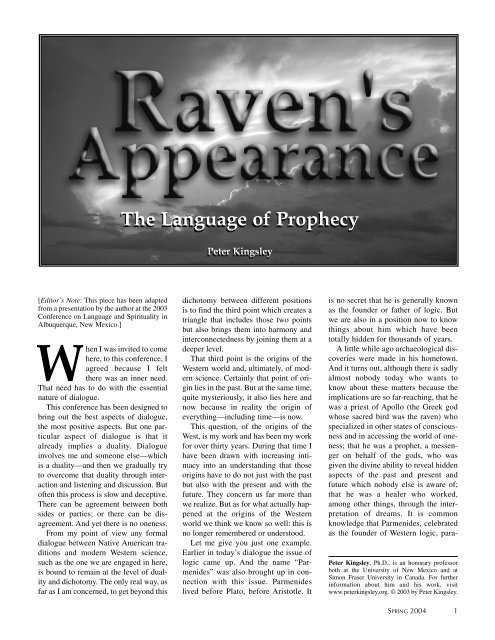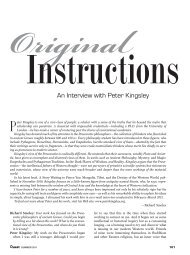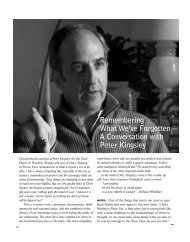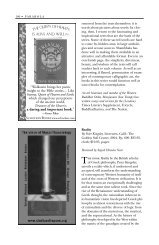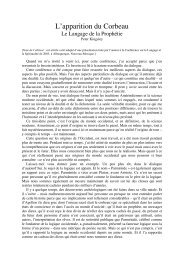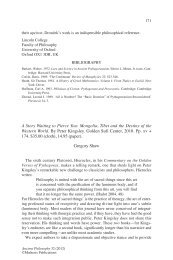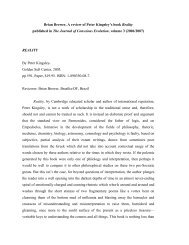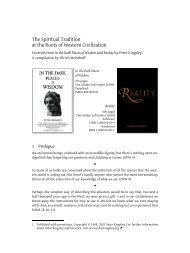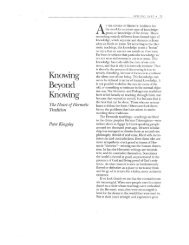The Language of Prophecy - Peter Kingsley
The Language of Prophecy - Peter Kingsley
The Language of Prophecy - Peter Kingsley
Create successful ePaper yourself
Turn your PDF publications into a flip-book with our unique Google optimized e-Paper software.
<strong>The</strong> <strong>Language</strong> <strong>of</strong> <strong>Prophecy</strong><br />
<strong>Peter</strong> <strong>Kingsley</strong><br />
[Editor’s Note: This piece has been adapted<br />
from a presentation by the author at the 2003<br />
Conference on <strong>Language</strong> and Spirituality in<br />
Albuquerque, New Mexico.]<br />
When I was invited to come<br />
here, to this conference, I<br />
agreed because I felt<br />
there was an inner need.<br />
That need has to do with the essential<br />
nature <strong>of</strong> dialogue.<br />
This conference has been designed to<br />
bring out the best aspects <strong>of</strong> dialogue,<br />
the most positive aspects. But one particular<br />
aspect <strong>of</strong> dialogue is that it<br />
already implies a duality. Dialogue<br />
involves me and someone else—which<br />
is a duality—and then we gradually try<br />
to overcome that duality through interaction<br />
and listening and discussion. But<br />
<strong>of</strong>ten this process is slow and deceptive.<br />
<strong>The</strong>re can be agreement between both<br />
sides or parties; or there can be disagreement.<br />
And yet there is no oneness.<br />
From my point <strong>of</strong> view any formal<br />
dialogue between Native American traditions<br />
and modern Western science,<br />
such as the one we are engaged in here,<br />
is bound to remain at the level <strong>of</strong> duality<br />
and dichotomy. <strong>The</strong> only real way, as<br />
far as I am concerned, to get beyond this<br />
dichotomy between different positions<br />
is to find the third point which creates a<br />
triangle that includes those two points<br />
but also brings them into harmony and<br />
interconnectedness by joining them at a<br />
deeper level.<br />
That third point is the origins <strong>of</strong> the<br />
Western world and, ultimately, <strong>of</strong> modern<br />
science. Certainly that point <strong>of</strong> origin<br />
lies in the past. But at the same time,<br />
quite mysteriously, it also lies here and<br />
now because in reality the origin <strong>of</strong><br />
everything—including time—is now.<br />
This question, <strong>of</strong> the origins <strong>of</strong> the<br />
West, is my work and has been my work<br />
for over thirty years. During that time I<br />
have been drawn with increasing intimacy<br />
into an understanding that those<br />
origins have to do not just with the past<br />
but also with the present and with the<br />
future. <strong>The</strong>y concern us far more than<br />
we realize. But as for what actually happened<br />
at the origins <strong>of</strong> the Western<br />
world we think we know so well: this is<br />
no longer remembered or understood.<br />
Let me give you just one example.<br />
Earlier in today’s dialogue the issue <strong>of</strong><br />
logic came up. And the name “Parmenides”<br />
was also brought up in connection<br />
with this issue. Parmenides<br />
lived before Plato, before Aristotle. It<br />
is no secret that he is generally known<br />
as the founder or father <strong>of</strong> logic. But<br />
we are also in a position now to know<br />
things about him which have been<br />
totally hidden for thousands <strong>of</strong> years.<br />
A little while ago archaeological discoveries<br />
were made in his hometown.<br />
And it turns out, although there is sadly<br />
almost nobody today who wants to<br />
know about these matters because the<br />
implications are so far-reaching, that he<br />
was a priest <strong>of</strong> Apollo (the Greek god<br />
whose sacred bird was the raven) who<br />
specialized in other states <strong>of</strong> consciousness<br />
and in accessing the world <strong>of</strong> oneness;<br />
that he was a prophet, a messenger<br />
on behalf <strong>of</strong> the gods, who was<br />
given the divine ability to reveal hidden<br />
aspects <strong>of</strong> the past and present and<br />
future which nobody else is aware <strong>of</strong>;<br />
that he was a healer who worked,<br />
among other things, through the interpretation<br />
<strong>of</strong> dreams. It is common<br />
knowledge that Parmenides, celebrated<br />
as the founder <strong>of</strong> Western logic, para-<br />
<strong>Peter</strong> <strong>Kingsley</strong>, Ph.D., is an honorary pr<strong>of</strong>essor<br />
both at the University <strong>of</strong> New Mexico and at<br />
Simon Fraser University in Canada. For further<br />
information about him and his work, visit<br />
www.peterkingsley.org. © 2003 by <strong>Peter</strong> <strong>Kingsley</strong>.<br />
SPRING 2004 1
doxically presented this famous logic<br />
<strong>of</strong> his in the form <strong>of</strong> a poem—in the<br />
meter <strong>of</strong> sacred poetry. But what is not<br />
understood is that he brought logic into<br />
the Western world from another world.<br />
And he brought it as a gift from the<br />
gods which was meant to take us back<br />
to the gods.<br />
Parmenides is only one part <strong>of</strong> the<br />
whole picture, though. Not only he, but<br />
also other people around him who lived<br />
at roughly the same time, brought into<br />
existence the groundwork for what<br />
could be estimated at being well over<br />
ninety percent <strong>of</strong> Western culture. And<br />
they brought it in as a gift. I am talking<br />
not just about logic but also about all the<br />
fundamental aspects <strong>of</strong> Western science,<br />
from cosmology and astronomy through<br />
to the roots <strong>of</strong> psychology.<br />
<strong>The</strong>re are many, many things that I<br />
learn and have learned from these<br />
Greeks who lived two and a half thousand<br />
years ago. But the key, the one<br />
most important thing, that I have<br />
learned from them is that there are two<br />
ways <strong>of</strong> talking—just as there are two<br />
different ways <strong>of</strong> perceiving.<br />
<strong>The</strong>re is the pr<strong>of</strong>ane way <strong>of</strong> talking,<br />
which is to talk about things. And if<br />
you care to notice, you will see that in<br />
the modern Western world we always<br />
talk about something. <strong>The</strong>re is the<br />
word; then there is the point <strong>of</strong> reference<br />
for the word, which is always<br />
separate from the word itself. And this,<br />
<strong>of</strong> course, is the basis for nearly all<br />
modern linguistics.<br />
But according to people such as Parmenides<br />
there is another way <strong>of</strong> talking.<br />
This other way is that instead <strong>of</strong> talking<br />
about, you talk from. If you sense oneness<br />
you talk from oneness; and that<br />
oneness is communicated through the<br />
magic <strong>of</strong> the word in a way that our<br />
minds may find incomprehensible but<br />
that, even so, fascinates and endlessly<br />
obsesses them. For these people were<br />
magicians. <strong>The</strong> founders <strong>of</strong> logic and<br />
science in the West were sorcerers. <strong>The</strong>y<br />
knew what they were doing even if,<br />
now, no one knows what they did.<br />
And this question <strong>of</strong> how we talk is<br />
also related to the question <strong>of</strong> how we<br />
discover. In the modern West we are<br />
governed, dominated, by the assumption<br />
that we discover things through<br />
time. By searching, by experimenting,<br />
2ReVision VOL. 26 NO. 4<br />
we will eventually uncover the nature <strong>of</strong><br />
reality bit by bit. This pr<strong>of</strong>ane model <strong>of</strong><br />
discovery was already established in the<br />
West very many centuries ago. And it<br />
has given rise to a catastrophic sense <strong>of</strong><br />
estrangement from ourselves and everything<br />
else. We spend the whole <strong>of</strong> our<br />
lives searching for solutions and only<br />
uncovering more problems; searching<br />
for ourselves but never finding; looking<br />
for answers in the places where we<br />
assume and expect them to be while<br />
neglecting the wisdom being communicated<br />
to us from every direction.<br />
<strong>The</strong> sacred model is based on an altogether<br />
different principle: on the principle<br />
that you simply have to discover<br />
everything is already there to begin<br />
with. It is all there to begin with because<br />
everything is given. Everything we ever<br />
need to know is automatically provided<br />
to us in the very moment when we need<br />
to know it. <strong>The</strong>re is only one requirement<br />
for entering into a living relationship<br />
with this sacred model: the ability<br />
to be open to the unexpected and the<br />
unknown.<br />
I will give an example. We all know<br />
what happened on September 11,<br />
2001—or at least we know about the<br />
outer events. But three days before, on<br />
September 8, a raven came and told me<br />
what was going to happen.<br />
We tend as a rule to think about language<br />
in terms <strong>of</strong> verbs and nouns,<br />
adjectives and pronouns. But while<br />
these considerations can help us understand<br />
certain aspects <strong>of</strong> the mechanics<br />
that allow us to speak, they can just as<br />
easily hide us away from the sacred<br />
dimensions <strong>of</strong> language and from the<br />
infinite mysteries <strong>of</strong> communication.<br />
For a long time I have been fascinated<br />
by the tradition in ancient Greece, and<br />
many other cultures, about the “language<br />
<strong>of</strong> the birds.” And several years<br />
ago I was out walking with the son <strong>of</strong> a<br />
friend who was studying at a prestigious<br />
college, here in New Mexico, where he<br />
was learning about the classics and<br />
humanities. We were walking up a hill<br />
together in some beautiful countryside,<br />
and I asked him: “What have you really<br />
learned? What is the most important<br />
thing you have discovered at college?”<br />
He answered: “<strong>The</strong> most wonderful<br />
thing I have learned is that we humans<br />
have language.” I asked if he meant that<br />
nothing else has language and he said:<br />
“No, nothing else, this is something<br />
quite unique to humans.” As we were<br />
walking there were hawks calling out to<br />
each other from around and above us, so<br />
I asked: “What about the hawks?” And<br />
he said: “What about them? That’s not<br />
language.” Because <strong>of</strong> his conditioning,<br />
his education, he could not hear. He was<br />
simply unable to acknowledge that two<br />
hawks calling to each other could possibly<br />
be using language.<br />
So, now for what happened on September<br />
8.<br />
I was alone at home at the time, on<br />
the island where my wife and I were living<br />
<strong>of</strong>f the west coast <strong>of</strong> Canada. In the<br />
afternoon I heard a raven calling from<br />
just outside the window where I was:<br />
the house had an enormous number <strong>of</strong><br />
windows looking out over all the trees<br />
and the lake. I went on writing.<br />
<strong>The</strong> raven was calling loudly and insistently.<br />
I was aware <strong>of</strong> its call: I was, and<br />
am, very conscious <strong>of</strong> birds. I thought it<br />
must be calling to another bird. But then<br />
all <strong>of</strong> a sudden I was able to separate<br />
from myself and I became aware that it<br />
was circling the house I was in, flying in<br />
a clockwise direction and stopping <strong>of</strong>f<br />
repeatedly to continue its calling.<br />
Nothing like this had happened<br />
before. To begin with I tried to go on<br />
with my writing, but then came the<br />
moment when I knew without a doubt<br />
that the raven was calling to me. So I<br />
stood up, went through the house and<br />
out onto the tall deck which was facing<br />
due south. <strong>The</strong>re, right in front <strong>of</strong> me on<br />
the branch <strong>of</strong> a tree and looking straight<br />
at me, exactly at my height, was the<br />
raven.<br />
As soon as it saw me, it started crying<br />
out continuously without stopping. I had<br />
no idea what it was saying, but I was<br />
sure it was communicating something.<br />
<strong>The</strong>n it stopped. I remember this so<br />
vividly. I said to it: “What’s the matter?”<br />
It started flapping its wings and calling<br />
out again, still on the branch in front <strong>of</strong><br />
me. I could not understand. It stopped<br />
and I asked again: “What are you trying<br />
to tell me?” This time it flapped its<br />
wings even more intensely. It started rising<br />
from the branch and kept on flapping<br />
its wings while hovering right in<br />
front <strong>of</strong> me. I was completely attentive.<br />
By now I knew it had a message. I lis-
tened to it not just with my ears but<br />
from deep inside myself.<br />
And in that moment it spoke to me,<br />
inside me. Its message came straight<br />
through to me in English words: not in<br />
raven language, or in any indigenous<br />
language, but in words I could understand.<br />
It said to me, “I have come here<br />
to tell you that there is about to be terrible<br />
death and destruction.” And from<br />
the way it communicated I knew it was<br />
referring to death and destruction which<br />
would affect not me or my wife particularly,<br />
but the whole world.<br />
What does it mean when a bird talks?<br />
What does it mean when you are still<br />
enough to hear the bird talking? What<br />
really is happening when a raven comes<br />
and tells someone what is going to happen?<br />
And what is the language <strong>of</strong><br />
birds—not the language <strong>of</strong> English or<br />
Spanish, or even the language <strong>of</strong><br />
humans, but the language <strong>of</strong> the birds?<br />
<strong>The</strong>se are the questions that no one in<br />
the modern Western world we live in,<br />
with all its apparent knowledge, can<br />
answer anymore. But they are also questions<br />
that come from an infinite depth<br />
and, if we allow them, can take us<br />
straight back into the infinite depth they<br />
come from. That is the depth <strong>of</strong> oneness<br />
where every culture and language and<br />
creature has its origin.<br />
How is this publication thinking about the future?<br />
By becoming part <strong>of</strong> the past. This publication is available from ProQuest<br />
Information and Learning in one or more <strong>of</strong> the following ways:<br />
• Online, via the ProQuest ® information service<br />
• Micr<strong>of</strong>orm<br />
• CD-ROM<br />
• Via database licensing<br />
Electronic Databases Micr<strong>of</strong>orm & Print<br />
Chadwyck-Healey Curriculum Products<br />
For more information, call<br />
1-800-521-0600, ext. 2888 (US) or 01-734-761-4700 (International)<br />
www.il.proquest.com<br />
From<br />
SPRING 2004 3


